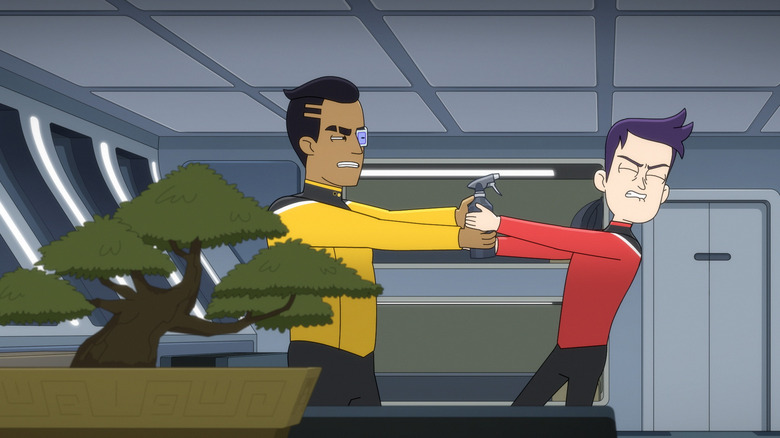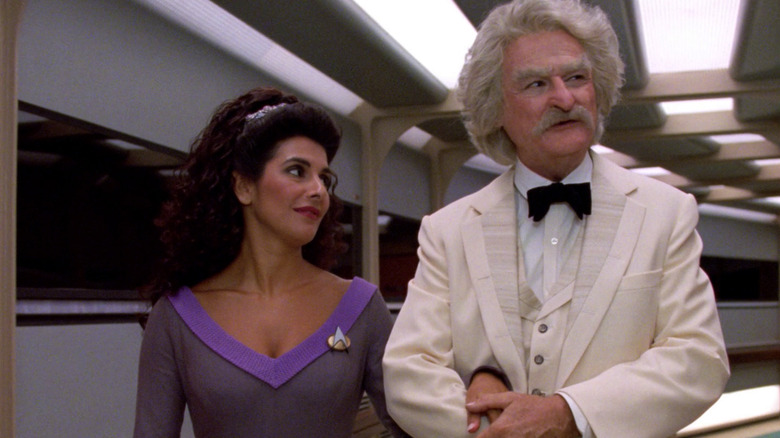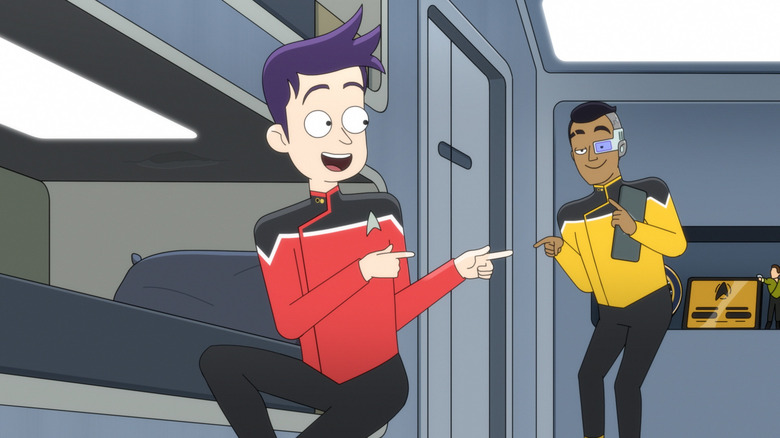Star Trek: Lower Decks Season 4's Ultra-Nerdy Mark Twain Joke, Explained
The fourth episode of the fourth season of "Star Trek: Lower Decks," called "Something Borrowed, Something Green," sees Lieutenant Boimler (Jack Quaid) and Lieutenant Rutherford (Eugene Cordero) sharing a dorm. In previous seasons, when the characters were merely ensigns, they slept in bunks in a hallway. They now have an enclosed private room for the first time, a wrinkle that soon has the two at each other's throats. Notably, they have come to blows over which of them gets to mist the room's adorable bonsai tree. Low-stakes animosity immediately forms. To make matters worse, Boimler's and Rutherford's respective holodeck hours have been double-booked, and they will have to share the day's recreation time together as well.
Curiously, both Boimler and Rutherford enter the holodeck dressed as Mark Twain, eager to spend a few quiet hours on an old-timey Mississippi riverboat. Affecting Twainian accents, the two begin by hurling insults, but soon find that their mutual Twaindencies cause them to bond. It seems they can more diplomatically negotiate living disputes when dressed as Mark Twain. Boimler and Rutherford liked their Twain diplomacy technique so much, they later suggest Captain Freeman (Dawnn Lewis) and a vicious Chalnoth try it out themselves. Absurdity ensues.
Trekkies will happily recognize the appearance of Mark Twain on "Star Trek" as more than a mere literary reference. Twain once appeared as a character on an infamous two-part time-travel episode of "Star Trek: The Next Generation" called "Time's Arrow" from 1992. It seems that the very long-lived Guinan (Whoopi Goldberg) lived on Earth in 1893 and was friends with the affable Twain, whose real name was Samuel Clemens (Jerry Hardin).
Time's Arrow
The plot of "Time's Arrow" is, as are all time-travel stories, a little complicated. A replica of Data's head was found in a cave back on Earth, leading the crew of the USS Enterprise-D to investigate. Through a complex series of events, they find a species of pan-dimensional aliens resting in the cave, as well as a time portal that leads back centuries. The aliens have been plundering Earth's past, sucking energy from the locals and using the energy as food. They're essentially soul vampires. Data (Brent Spiner) is thrown back in time where he attempts to blend in, and where he meets a younger Guinan and Mark Twain in his heyday. The rest of the Enterprise crew follows Data later on.
It will be Twain who, thanks to Data's odd appearance and some overheard sci-fi tech talk, begins to suspect that there may be a time traveler in their midst. Given that he wrote "A Connecticut Yankee in King Arthur's Court" a few years prior to the events of "Time's Arrow," Twain is open to the fantastical possibility.
Also, not to disappoint viewers, the writers of "Time's Arrow" also wanted to feature a scene wherein Twain is brought back to the future where he would be allowed to wander the halls of the Enterprise. In a notable scene with Counselor Troi (Marina Sirtis), Twain finds the post-capitalist utopia of "Star Trek" baffling. He initially assumes that the Enterprise is built to destroy cities and engage in military conquest; he's heard the "we're only here to explore" line from too many colonialists in the past.
Troi explains there is no more poverty, and that power is no longer an end unto itself. Twain is impressed and says he'd give up cigars for a future like that.
Trek's weird obsession with the past
We've previously written about how, when 20th-century pop music appears on "Star Trek," it feels a little weird. Because there is a commercial element to modern pop — a licensing deal would have to be struck in order for a pop song to appear on a Paramount-owned TV show — it invites an unwelcome corporate element to a TV series that gains its power by being expressly post-capitalist. It also avoids presumptuousness on the screenwriters' parts, freeing them from speculation that something written in the recent past will be timeless enough to live into the 24th century.
As such, when "Trek" refers to Earth's ancient art, it's typically music and literature that is in the public domain. People on "Star Trek" listen to classical music and to jazz, but rarely to pop, punk, hip-hop, or anything immediately known to the modern ear. As a result, wisdom — by the show's estimation — comes from an ancient list of classics that resembles Harold Bloom's stodgy "Western Canon." The writers of the original "Star Trek" certainly felt that way, as they were all born in the 1920s and 1930s, and were raised on a certain type of "classical" education. When it came to literary references, "Trek" leaned into Shakespeare, Shelley, and numerous other dead Brits.
Mark Twain, then, was fair game for "Star Trek." His works were old enough to adhere to the show's unspoken mandate of public domain art, but folksy enough to be relatable to a modern audience. It certainly helps that Twain's works are still read in schools to this day, adding familiarity as well; Twain is hardly obscure.
So, yes, Boimler and Rutherford would know about Twain and would be happy to play dress-up.


